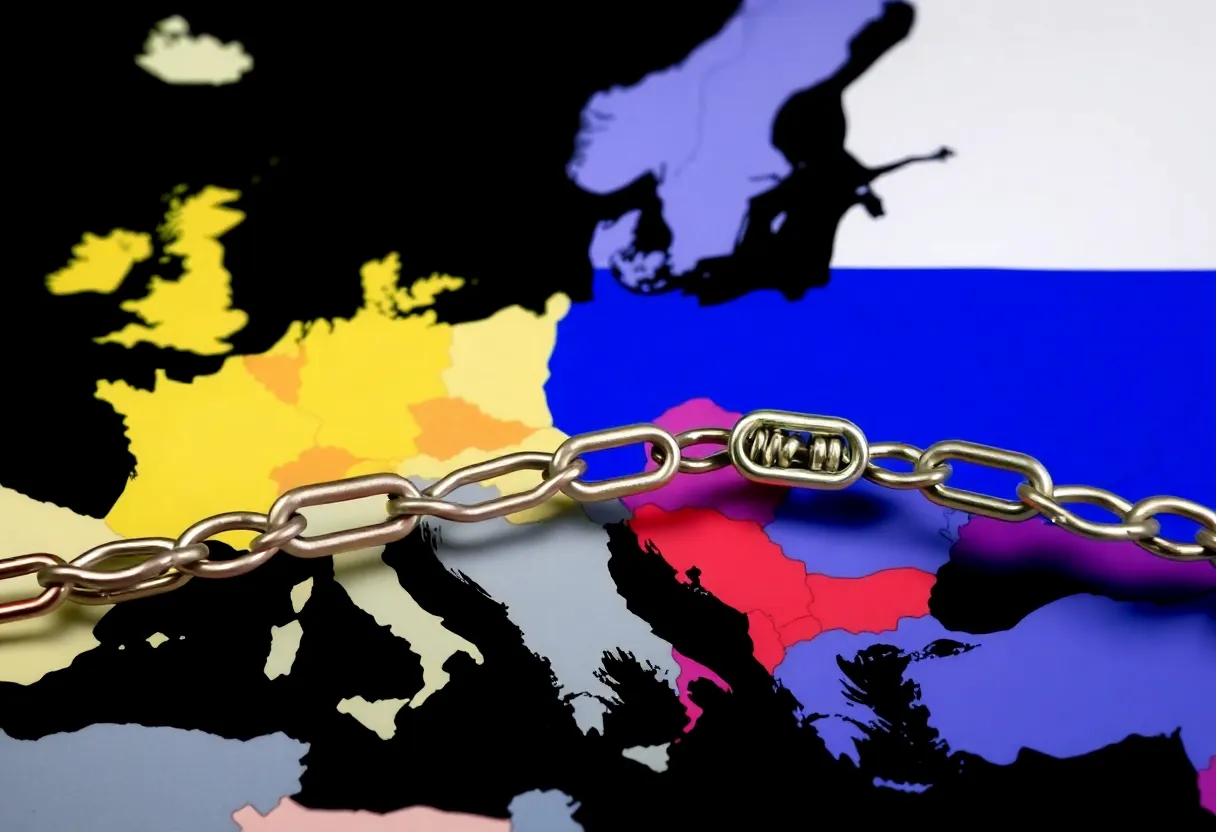News Summary
Ukrainian President Volodymyr Zelensky is calling for stronger sanctions against Russia during a European Council summit. He highlighted concerns over critical weapons components from Europe being sent to Russia, urging a robust expansion of the existing sanctions package. Zelensky emphasized the need to target not only the ‘shadow fleet’ of vessels but also the ports and captains involved in Russian oil exports. His call for unity and decisive action comes amidst tensions within the EU, as some member states remain dependent on Russian energy.
Zelensky Urges EU to Ratchet Up Sanctions Against Russia
Ukrainian President Volodymyr Zelensky is taking a firm stand as he calls on European leaders to impose stronger sanctions on Russia. This urgent plea came during a video address to the European Council summit held on June 26, where Zelensky highlighted ongoing concerns about critical weapons components that are still being sent from Europe to Russia.
European Companies Under Scrutiny
In his address, Zelensky made it clear that some European firms are unwittingly—or maybe even knowingly—fueling Russia’s military ambitions. He pointed out that these components are being used to manufacture missiles and other lethal weapons that pose a direct threat to Ukrainian lives. Ukraine is actively tracking these materials and intends to provide substantial evidence to EU officials, hoping to kindle a quicker response.
Expanding Sanctions Packages
Zelensky is advocating for a robust expansion of the sanctions package currently imposed on Russia. Although the EU recently came to an agreement to extend existing sectoral sanctions for an additional six months, discussions continue on introducing a proposed 18th sanctions package. President Zelensky is urging the EU to make this new package “truly strong,” specifically aimed at crippling Russia’s oil trade, financial instruments, and weapon manufacturing supply chains.
Stricter Measures on Russian Oil Trade
Among his recommendations, Zelensky emphasized the critical importance of imposing sanctions not just on vessels known as the “shadow fleet,” but also on their captains, as well as the ports that facilitate Russia’s oil exports. He also proposed a sharp reduction in the current oil price cap, suggesting it be lowered to $30 per barrel. According to him, this cap should be tied to Russia’s military actions and ambitions, directly linking energy income to its war efforts.
The Complex Energy Landscape in Europe
Despite his strong positions, Zelensky is well aware of the complicated dynamics at play. Many European countries still heavily rely on Russian oil and gas, making the sanctions debate a genuinely daunting challenge. He acknowledged the tensions between countries like Slovakia and Hungary, who are more inclined to protect their energy interests rather than support sweeping sanctions.
Frustrations and Calls for Unity
There’s a palpable sense of frustration in Zelensky’s address; he feels that not all European leaders truly understand Ukraine’s plight or the immediacy of its needs. His call for a clear signal of EU support for Ukraine’s aspirations to join the European community was a central theme. He stressed that Ukraine has been diligently fulfilling its obligations in the accession process, and any delays from Europe could weaken not only trust in commitments made, but also set a precarious precedent for future alliances.
Political Pressures Within the EU
Adding layers to these discussions, Slovak Prime Minister Robert Fico has threatened to veto the 18th sanctions package, citing his country’s dependence on Russian energy. This move positions him as a supporter of Russia within EU politics, complicating the overall strategy. Hungarian Prime Minister Viktor Orban also put a wrench in the works during the Brussels summit by blocking a unanimous statement of support for Ukraine’s EU accession, despite the backing of 26 other member states.
A Call for Action
President Zelensky’s passionate appeal underlines the urgency for Europe to rally together and act decisively. More than just a plea for aid, it’s a heartfelt request for solidarity against a common adversary. The situation calls for unity, understanding, and a commitment to uphold democratic values—all vital to Ukraine’s future and its place in the European community.
Deeper Dive: News & Info About This Topic
- Reuters: US Halts Some Missile Shipments to Ukraine
- Wikipedia: Sanctions against Russia
- Times of India: Trump Pauses Key Weapons Shipments to Kyiv
- Google Search: Russia Ukraine War
- The Guardian: Ukraine War Live Updates
- Encyclopedia Britannica: Ukraine
- New York Times: Trump and Ukraine Weapons
- Google News: Zelensky sanctions Russia
- Reuters: US Arms Shipments to Kyiv Briefly Paused
- Google Scholar: Ukraine crisis

Author: STAFF HERE PETERSBURG WRITER
The ST PETERSBURG STAFF WRITER represents the experienced team at HEREStPetersburg.com, your go-to source for actionable local news and information in St Petersburg, Pinellas County, and beyond. Specializing in "news you can use," we cover essential topics like product reviews for personal and business needs, local business directories, politics, real estate trends, neighborhood insights, and state news affecting the area—with deep expertise drawn from years of dedicated reporting and strong community input, including local press releases and business updates. We deliver top reporting on high-value events such as Grand Prix of St. Petersburg, Localtopia, and SHINE Mural Festival. Our coverage extends to key organizations like the St. Petersburg Area Chamber of Commerce and St. Pete Downtown Partnership, plus leading businesses in finance, manufacturing, and healthcare that power the local economy such as Raymond James Financial, Jabil, and Bayfront Health St. Petersburg. As part of the broader HERE network, including HEREJacksonville.com, HEREOrlando.com, HERETallahassee.com, and HERETampa.com, we provide comprehensive, credible insights into Florida's dynamic landscape.



